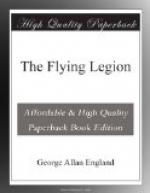“Franks,” the Master said, vastly relieved
at this unexpected amity.
Strange contrast with the violent hostility heretofore
experienced!
What might it mean? What might be hidden beneath
this quiet surface?
Relief and anxiety mingled in the Master’s mind. If treachery were intended, in just this manner would it speak.
“Men of Feringistan?” asked the aged Sheik. “And what do ye here?”
“We be fighting-men, all,” replied the Master. He had already noted, with a thrill of admiration, the wondrous purity of the old man’s Arabic. His use of final vowels after the noun, and his rejection of the pronoun, which apocope in the Arabic verb renders necessary in the everyday speech of the people, told the Master he was listening to some archaic, uncorrupted form of the language. Here indeed was nobility of blood, breed, speech, if anywhere!
“Fighting-men, all,” the Master repeated, while Leclair listened with keen enjoyment and the Legion stood attentive, with the white-burnoused horsemen giving ear to every word—astonished, no doubt, to hear Arabic speech from the lips of an unbeliever. “We have traveled far, from the Lands of the Books. Is it not meritorious, O Sheik? Doth not thy Prophet himself say: ’Voyaging is victory, and he who journeyeth not is both ignorant and blind?"’
The old man pondered a moment, then fell to stroking his beard. The act was friendly, and of good portent. He murmured:
“I see, O Frank, that thou hast read the Strong Book. Thou dost know our law, even though thou be from Feringistan. What is thy name?”
“Men know me only as The Master. And thine?”
“Bara Miyan (The Great Sir), nothing more.”
“Dost thou wish us well?” the Master put a leading question.
“Kull’am antum bil khair!” (May ye be well, every year!) said the old Sheik. The Master sensed a huge relief. Undoubtedly—hard as this was to understand, and much as it contradicted Rrisa’s prediction—the attitude of these Jannati Shahr folk was friendly. Unless, indeed, all this meant ambush. But to look into those grave, deep eyes, to see that furrowed countenance of noble, straight-forward uprightness, seemed to negative any such suspicion.
“We have come to bring ye wondrous gifts,” the Master volunteered, wanting to strike while the iron was hot.
“That is well,” assented Bara Miyan. “But never before have the Franks come to this center of the Empty Abodes.”
“Even Allah had to say ‘Be!’ before anything was!” (i.e., there must be a first time for everything).
This answer, pat from a favorite verse of the Koran, greatly pleased Bara Miyan. He smiled gravely, and nodded.
“Allah made all men,” he affirmed. “Mayhap the Franks and we be brothers. Have ye come by way of Mecca?”
“Yea. And sorry brotherhood did the Mecca men offer us, O Sheik! So, too, the men of Beni Harb. Together, they slew five of us. But we be fighting-men, Bara Miyan. We took a great vengeance. All that tribe of Beni Harb we brushed with the wing of Azrael, save only the Great Apostate. And from the men of the ’Navel of the World’—Mecca—we exacted greater tribute than even death!”




